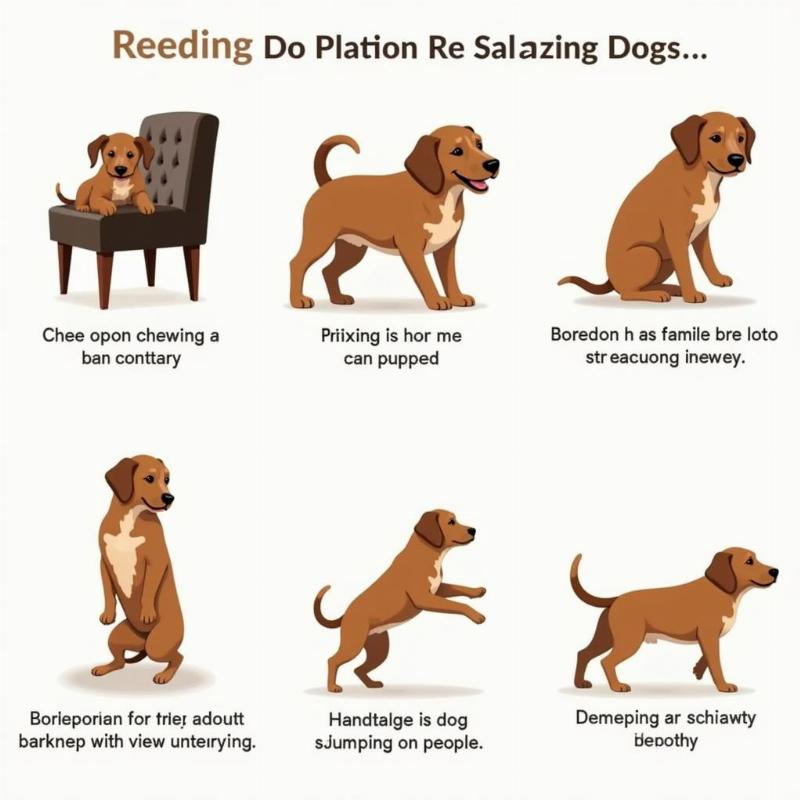If your adult dog suddenly behaves like a young dog, bouncing with energy, chewing on everything in sight, or experiencing accidents, you’re not alone. While some adult dogs naturally retain a playful spirit, sudden changes in behavior can indicate underlying issues. Understanding why your “behaves like a young dog” can help you address the root cause and ensure your furry friend’s well-being. This article explores the common reasons for puppy-like behavior in adult dogs and provides valuable insights into managing these changes.
Medical Reasons for Puppy-Like Behavior
Several medical conditions can contribute to a resurgence of puppy-like behaviors in older dogs. Cognitive Dysfunction Syndrome (CDS), similar to dementia in humans, can cause confusion, disorientation, and changes in learned behaviors. Hyperthyroidism, an overactive thyroid, can lead to increased energy levels and restlessness, mimicking puppy-like hyperactivity. Pain or discomfort from arthritis or other ailments can also manifest as increased anxiety, restlessness, and even aggression, sometimes misinterpreted as playful nipping.
If your dog exhibits a sudden and drastic change in behavior, a visit to your veterinarian is crucial. They can conduct a thorough examination, perform necessary tests, and rule out any underlying medical issues. Early diagnosis and treatment are key to managing these conditions and improving your dog’s quality of life.
Behavioral Reasons for Puppy-Like Behavior
Beyond medical reasons, several behavioral factors can explain why your adult dog behaves like a puppy. A sudden change in routine, such as a new family member, a move, or changes in work schedules, can cause stress and anxiety, leading to regression in behavior. Boredom and lack of mental and physical stimulation can also trigger destructive chewing, excessive barking, and other puppy-like behaviors. Additionally, if your dog hasn’t received consistent training or socialization, they may exhibit puppy-like behaviors even as adults.
 Behavioral reasons dog behaves young
Behavioral reasons dog behaves young
Addressing behavioral issues often involves adjusting your dog’s routine, providing ample opportunities for exercise and mental enrichment, and reinforcing basic training commands. Consider enrolling in obedience classes or consulting with a certified dog trainer for personalized guidance.
Managing Puppy-Like Behavior in Adult Dogs
Whether the cause is medical or behavioral, managing puppy-like behavior in adult dogs requires a multi-faceted approach. Providing a consistent routine, offering age-appropriate toys and activities, and creating a safe and predictable environment are essential steps. Ensuring your dog gets enough exercise and mental stimulation through walks, playtime, and puzzle toys can help channel their energy positively.
Consistent training and reinforcement of basic commands can help re-establish boundaries and address undesirable behaviors. If you suspect your dog is experiencing pain, consult with your veterinarian to explore pain management options. Remember to be patient and understanding throughout this process, as it takes time and consistency to help your dog adjust.
Conclusion
While a playful spirit can be endearing, understanding why your adult dog “behaves like a young dog” is crucial for their overall health and well-being. By addressing underlying medical or behavioral issues, providing adequate stimulation, and reinforcing training, you can help your furry friend navigate these changes and enjoy a happy, balanced life. Remember to consult with your veterinarian or a certified dog trainer for professional guidance and personalized support.
FAQ
- Why is my senior dog suddenly acting like a puppy? This could be due to medical conditions like CDS or hyperthyroidism, or behavioral factors like stress, boredom, or lack of training.
- How can I tell if my dog’s behavior is due to a medical issue? Sudden and drastic changes in behavior warrant a veterinary checkup.
- What can I do to manage my dog’s puppy-like behavior? Provide a consistent routine, ample exercise and mental stimulation, and reinforce basic training.
- Is it normal for some adult dogs to be more playful than others? Yes, some dogs naturally retain a playful demeanor throughout their lives.
- When should I consult with a dog trainer? If behavioral modifications aren’t effective, or if you’re struggling to manage your dog’s behavior, consulting a trainer can be beneficial.
- Can medications help with puppy-like behavior in adult dogs? If the behavior stems from a medical condition, your veterinarian may prescribe medication to manage the underlying issue.
- How can I make my home environment more suitable for my dog? Create a safe, predictable environment, and provide age-appropriate toys and activities.
Beautdogs.us is your trusted online resource for comprehensive dog care information, breed-specific guidance, and product recommendations in the USA. We offer expert advice for both new and experienced dog owners, helping you navigate every aspect of dog companionship. Contact us for personalized support at [email protected] or +1 501-555-7529. Visit Beautdogs.us for more valuable insights into caring for your beloved canine companion.